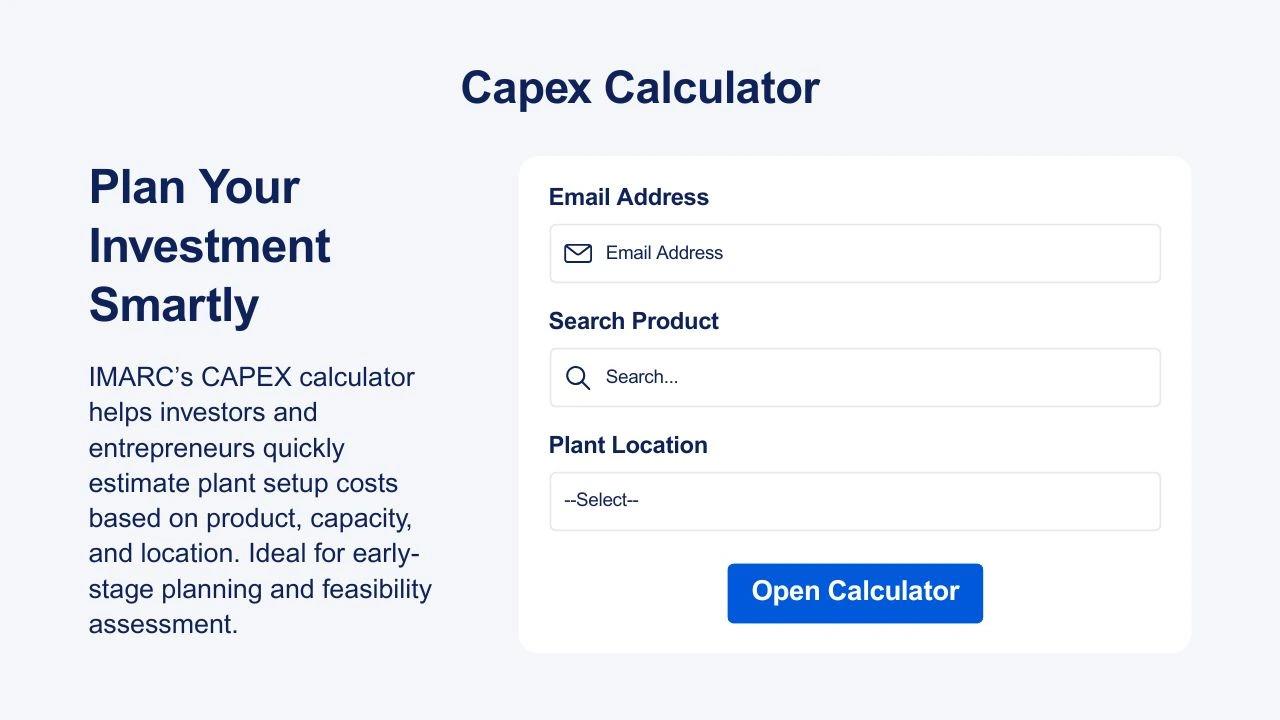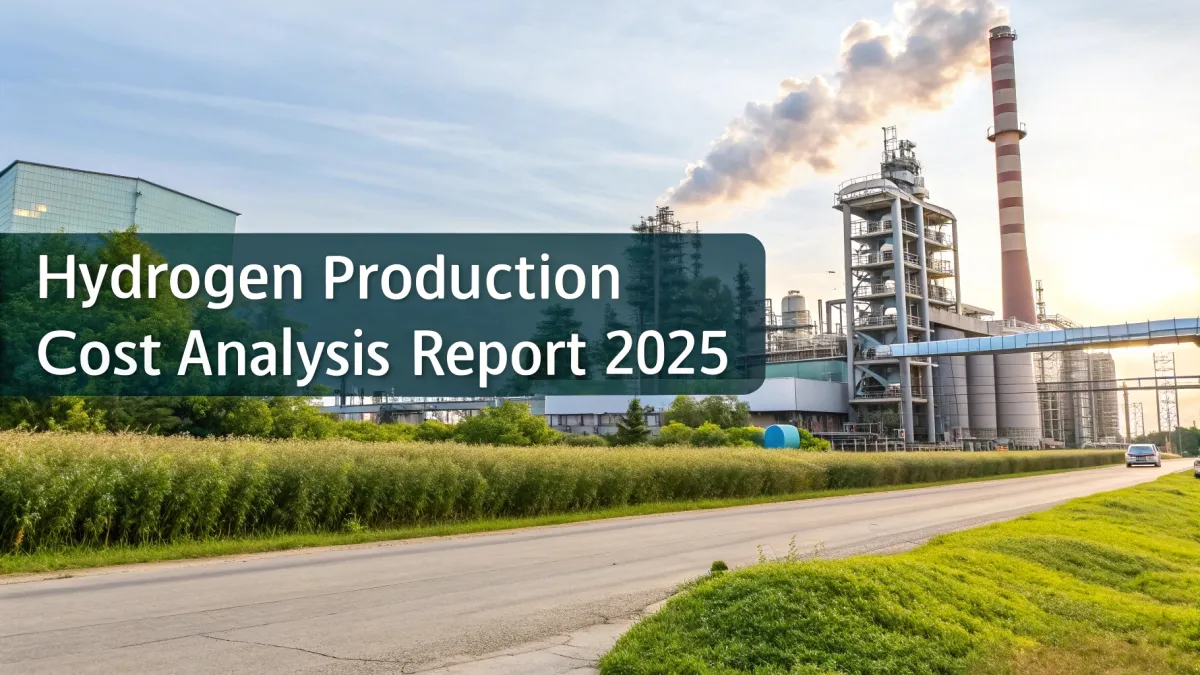
Hydrogen Production Cost Analysis 2025: A Comprehensive Guide And Capital Requirements
Setting up a hydrogen production plant involves selecting a production method such as steam methane reforming, electrolysis, or biomass gasification based on cost, feedstock availability, and environmental goals. Key requirements include access to raw materials, reliable utilities, storage and distribution systems, and compliance with safety standards. Strategic site selection and efficient process design are vital for minimizing production costs and ensuring operational sustainability.
IMARC Group's report, titled “ Hydrogen Production Cost Analysis Report 2025: Industry Trends, Plant Setup, Machinery, Raw Materials, Investment Opportunities, Cost and Revenue,” provides a complete roadmap for setting up a hydrogen production plant. It covers a comprehensive market overview to micro-level information such as unit operations involved, raw material requirements, utility requirements, infrastructure requirements, machinery and technology requirements, manpower requirements, packaging requirements, transportation requirements, etc.
This comprehensive business plan outlines every critical step involved in setting up a hydrogen production plant successful unit from understanding the industry landscape to planning for real-world challenges. It provides valuable insights into essential components such as hydrogen production plant setup, cost breakdown, machinery cost, operating cost, raw material requirements, utility needs, infrastructure setup, and packaging logistics.
Request for a Sample Report : https://www.imarcgroup.com/hydrogen-manufacturing-plant-project-report/requestsample
Hydrogen Industry Outlook 2025:
The hydrogen industry in 2025 is expected to experience accelerated growth driven by global decarbonization goals, technological advancements, and government incentives. Increasing adoption in transportation, industrial processes, and power generation, coupled with declining production costs for green hydrogen, will expand market opportunities. Strategic investments, international partnerships, and large-scale infrastructure projects are anticipated to strengthen supply chains. However, challenges such as storage, distribution, and high initial capital costs remain critical factors influencing market adoption and competitiveness.
Key Insights for Hydrogen Production Plant Setup:
Detailed Process Flow:
-
Product Overview
Unit Operations Involved
Mass Balance and Raw Material Requirements
Quality Assurance Criteria
Technical Tests
Project Details, Requirements and Costs Involved:
-
Land, Location and Site Development
Plant Layout
Machinery Requirements and Costs
Raw Material Requirements and Costs
Packaging Requirements and Costs
Transportation Requirements and Costs
Utility Requirements and Costs
Human Resource Requirements and Costs

Capital Expenditure (CapEx) and Operational Expenditure (OpEx) Analysis:
Project Economics:
-
Capital Investments
Operating Costs
Expenditure Projections
Revenue Projections
Taxation and Depreciation
Profit Projections
Financial Analysis
Profitability Analysis:
-
Total Income
Total Expenditure
Gross Profit
Gross Margin
Net Profit
Net Margin
Key Cost Components of Setting Up a Hydrogen Plant :
-
Land and Site Preparation – Acquisition of suitable land, site grading, and infrastructure development.
Production Technology and Equipment – Electrolyzers, reformers, compressors, and purification systems.
Feedstock Supply – Natural gas, water, or renewable electricity, depending on production method.
Storage Systems – High-pressure tanks, cryogenic storage, or underground storage facilities.
Distribution Infrastructure – Pipelines, transportation vehicles, and refueling stations.
Utilities and Support Systems – Power supply, cooling systems, and water treatment facilities.
Labor and Workforce – Skilled operators, engineers, and maintenance personnel.
Regulatory Compliance and Permitting – Environmental assessments, safety certifications, and legal fees.
Construction and Installation – Civil works, assembly, and integration of plant systems.
Contingency and Financing Costs – Reserve funds for unforeseen expenses and interest on project financing.
Economic Trends Influencing Hydrogen Plant Setup Costs 2025 :
-
Declining Renewable Energy Costs – Falling prices for solar and wind power reduce green hydrogen production expenses.
Government Incentives and Subsidies – Grants, tax credits, and policy support lower capital investment burdens.
Inflation and Material Price Volatility – Rising costs of steel, copper, and specialized components impact construction budgets.
Advancements in Production Technology – Improved electrolyzer efficiency and scaling lower operational costs.
Global Supply Chain Disruptions – Delays and shortages of critical equipment increase lead times and expenses.
Carbon Pricing and Emission Regulations – Stricter policies drive demand for hydrogen, influencing investment returns.
Interest Rate Fluctuations – Higher borrowing costs affect overall project financing feasibility.
Request for Customized Report: https://www.imarcgroup.com/request?type=report&id=8728&flag=E
Challenges and Considerations for Investors in Hydrogen Plant Projects:
-
High Initial Capital Requirements – Significant upfront investment needed for technology, infrastructure, and compliance.
Technology Maturity and Reliability – Variations in efficiency, durability, and scalability across production methods.
Feedstock Availability and Cost – Dependence on natural gas, renewable electricity, or water supply stability.
Market Demand Uncertainty – Fluctuating adoption rates in transportation, industrial, and power sectors.
Regulatory and Safety Compliance – Stringent environmental and operational standards increase complexity.
Storage and Transportation Challenges – Hydrogen's low density and high flammability require specialized infrastructure.
Competition from Alternative Energy Sources – Growth of battery storage and other clean fuels may impact market share.
Geopolitical and Supply Chain Risks – Equipment sourcing and raw material availability influenced by global events.
Conclusion:
The hydrogen industry presents significant opportunities for long-term growth, driven by the global push toward decarbonization and clean energy transition. While advancements in production technologies, falling renewable energy costs, and supportive policy frameworks enhance investment potential, the sector's capital-intensive nature, technological uncertainties, and infrastructure demands require careful risk assessment. Strategic planning, diversified supply chains, and alignment with evolving market and regulatory landscapes will be critical for maximizing returns. For investors, a balanced approach combining innovation adoption with prudent financial structuring offers the most viable path to capturing value in the rapidly expanding hydrogen economy.
About Us:
IMARC Group is a global management consulting firm that helps the world's most ambitious changemakers to create a lasting impact. The company excel in understanding its client's business priorities and delivering tailored solutions that drive meaningful outcomes. We provide a comprehensive suite of market entry and expansion services. Our offerings include thorough market assessment, feasibility studies, company incorporation assistance, factory setup support, regulatory approvals and licensing navigation, branding, marketing and sales strategies, competitive landscape, and benchmarking analyses, pricing and cost research, and procurement research.
Contact Us:
IMARC Group
134 N 4th St. Brooklyn, NY 11249, USA
Email: sales[@]imarcgroup.com
Tel No:(D) +91 120 433 0800
United States: (+1-201971-6302)
Legal Disclaimer:
MENAFN provides the
information “as is” without warranty of any kind. We do not accept
any responsibility or liability for the accuracy, content, images,
videos, licenses, completeness, legality, or reliability of the information
contained in this article. If you have any complaints or copyright
issues related to this article, kindly contact the provider above.

















Comments
No comment